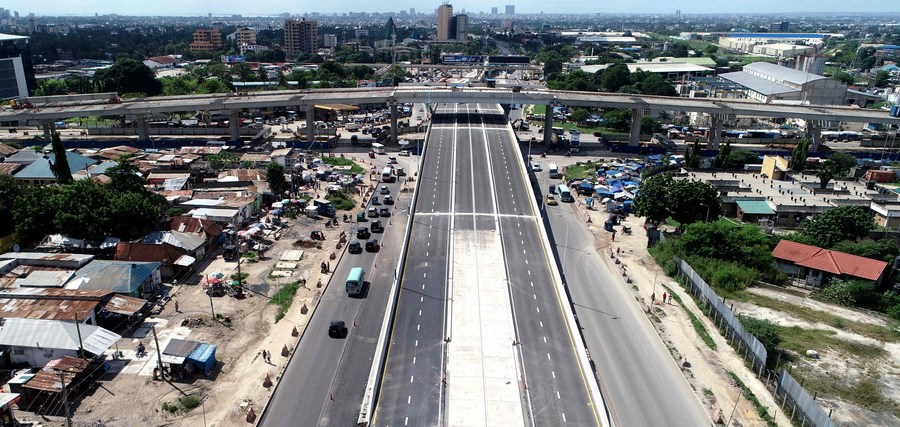
The Biden administration has sent five high-ranking officials to Africa in 2023. The most recent one is US Vice President Kamala Harris. During her visit, she repeatedly raised the issue of African debt, urging China to reduce debt owed by Ghana and Zambia.
The questions thus arise: Who is really responsible for Africa’s debt crisis? And who is exploiting African countries through debt?
Western multilateral financial institutions and commercial creditors hold majority of Africa's debt
According to the World Bank’s International Debt Report 2022, the majority of Africa's external debts is held by multilateral financial institutions and commercial creditors, 70 percent of which are owed to the World Bank and the International Monetary Fund (IMF). It is critical for all creditors, especially the US which is the largest shareholder of the World Bank and the IMF, to take responsibility and cooperate in resolving Africa's debt problems.
While China holds a smaller share of Africa's debt compared to other creditors, it has been actively involved in efforts to address the debt issue. According to the China-Africa Research Initiative at Johns Hopkins University, China has contributed up to 63 percent of the debt suspension amount under the G20 Debt Service Suspension Initiative. China also suspended payment of 5.7 billion USD in debt between May 2020 and October 2021, accounting for over half of the worldwide debt suspension total.
In Ghana, private creditors and multilateral institutions represented by the World Bank hold the majority of the debt, with only 6 percent owed to China, and China has actively participated in negotiations since Ghana declared its debt default in December 2022, sending officials to discuss related issues on-site.
Nigerian Vice President Osinbajo refuted concerns about the "Chinese debt trap" during a speech in King's College London in March, stating that China has been a valuable partner to Africa, providing assistance in building infrastructure and offering support.

The photo taken on May 2, 2020 shows the Chinese-built Ubungo Interchange under construction in Tanzania's commercial capital Dar es Salaam. (Photo/Xinhua)
Multinational institutions from US-led Western countries benefit most from African debt
Dozens of low- and middle-income countries in Africa may face the risk of debt default between 2023 and 2025, warned a report by Tsinghua University in 2022. Without access to new funds, these African countries could encounter a series of negative impacts such as rating downgrades, foreign exchange shortages, currency devaluation, and economic decline.
Large investment institutions from Europe and the US are responsible for the consequences, according to the Tsinghua report. These institutions have been stocking large number of European bonds issued by African countries, bringing unregulated international capital into these states. The interest rates on these Eurobonds are three to four times higher than those of bilateral and multilateral concessional loans, and are most short-term debts instead of the long-term ones the African countries need for infrastructure development.
Michael Hudson, a prominent economics professor, suggests that Western countries, particularly the US, are the biggest beneficiaries of Africa’s debts. Hudson argued in an interview with Xinhua in 2022 that the US is pushing third-world countries into bankruptcy using the monetary policy of the Federal Reserve, and forcing them to sell assets, while encouraging US enterprises to purchase industries in those countries to gain high returns. This practice is reminiscent of what happened in Argentina.
In 1989, Argentina defaulted on its debt, leading to inflation rates skyrocketing to over 3000%. In the same year, the country began privatizing its assets, which brought new vitality to the economy. However, this came at a steep cost: 90 percent of the fuel supply was controlled by four foreign companies, and foreign banks held 62 percent of the national banking system's total assets. By 1999, multinational corporations controlled 90.4 percent of Argentina's total exports and 63.3 percent of imports.
During another debt crisis in 2001, Elliott Capital Management's subsidiary, NML Capital Limited, bought a significant number of Argentine bonds below their face value. When Argentina defaulted on its debt, NML Capital refused the debt restructuring proposed and sued Argentina in a US court, demanding full repayment of the bond face value plus interest.
Nobel laureate in economics Joseph Eugene Stiglitz, in his book Freefall: America, Free Markets, and the Sinking of the World Economy, exposed how the US sells its economic model worldwide and lobbies developing countries to open their doors to it. Stiglitz noted that the US has pressured developing countries to hand over their companies and banks and even sell them at a lower price during a crisis.
"The financing cost of the bond market is very low, making it an attractive option for developing countries. However, this is precisely where the US exerts control over developing countries through the financial market," said Wang Jinqiang, Vice Dean of the School of Law, Shanghai University of International Business and Economics, to GDToday.
Co-presented by GDToday and School of Journalism and Communication, Jinan University
Author | Li Fuying (intern), Lydia Liu
Editor | Wing, Steven, Jerry
















